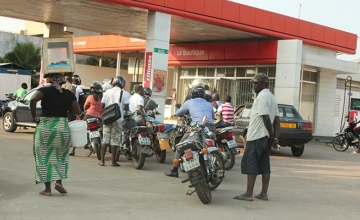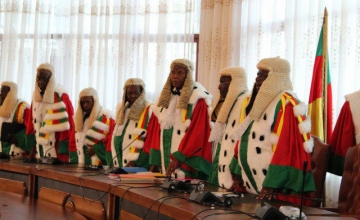
He was speaking in Yaoundé Wednesday, February 24, 2021, at the end of an audience granted him by Cameroon’s Minister of Territorial Administration, Atanga Nji Paul.
Being his second audience with the Minister since September 2020, Naab said it was a follow-up meeting to discuss the humanitarian response plan.
“We wanted to get his guidance and his advice on how we agree on the various components of the humanitarian response plan. It was a follow-up meeting intended to get guidance from His Excellency on how we move forward,” the UN Cameroon chief said. “We intend to launch this humanitarian response plan in the next 14 days. We agreed with the Minister on some key numbers and dates that we are going to agree on in the next two weeks to launch the humanitarian response plan.”
In all, Naab described as “excellent” the meeting with Minister Atanga Nji.
Although he fell short of detailing the extent of their discussion, the UN Resident Coordinator and Humanitarian Coordinator for Cameroon said he thanked the Minister and briefed him on his recent visit to the East region.
His words: “I also took the opportunity to thank the Minister and to brief him on my visit to the East Region. I went two and a half weeks ago on my first official visit to the East to see the refugee situation in the East. The refugees coming from the Central African Republic.”
“There, I was also impressed and I took the opportunity today to also brief the Minister about my impressions of the situation in the East,” Naab said.
“I was particularly touched by the generosity and the hospitality of the government and the people of Cameroon to our fellow brothers and sisters from the Central African Republic. I was impressed with the communal coexistence between refugees and host communities,” he furthered. “But at the same time, I was also touched by the needs that were expressed by not only the refugees but also by the host communities.”
He told the press that, “the UN Humanitarian country team is working very closely with the government in all the sectors to see how we can respond briskly and quickly to the needs of the region as a whole but also the needs of the vulnerable populations in the refugee camps but also in the host communities.”
The stakes
According to ACAPS, a non-profit project of a consortium of three NGOs - the Norwegian Refugee Council, Save the Children, and Mercy Corps, Cameroon hosts the largest refugee population from the Central African Republic, CAR.
ACAPS reports that no fewer than 290,000 CAR refugees are in Cameroon, mainly located in the East and Adamaoua regions.
“Many have been displaced for several years, including 45,000 people who have been in Cameroon for more than 10 years. Over 70% of CAR refugees are staying with host communities, putting significant pressure on already limited resources and service,” the nonprofit consortium states. “The CAR refugees are dependent on humanitarian assistance, with education, health, food, WASH, protection, shelter and livelihood opportunities reported as priority needs.”
With refugees and the host community sharing access to drinking water, fields, and social services such as education and health, there is a need for more support.
The situation is even dire given that nearly 5,000 people have recently arrived in Garouda-Boulaï (East Region) from CAR due to violence related to the elections held on December 27, 2020.
“They need shelter, WASH, and health assistance. Cameroon was already hosting over 300,000 refugees from CAR, mostly in the East, Adamawa, and North regions, where natural resources and essential services are limited,” ACAPS reports.














